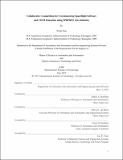Collaborative competition for crowdsourcing spaceflight software and STEM education using SPHERES Zero Robotics
Author(s)
Nag, Sreeja
DownloadFull printable version (7.840Mb)
Alternative title
Collaborative competition for crowdsourcing spaceflight software and Science, Technology, Engineering, Mathematics education using SPHERES Zero Robotics
Other Contributors
Massachusetts Institute of Technology. Department of Aeronautics and Astronautics.
Advisor
Jeffrey A. Hoffman and Olivier L. de Weck.
Terms of use
Metadata
Show full item recordAbstract
Crowdsourcing is being researched as a technique to develop small-scale spaceflight software by issuing open calls for solutions to large crowds of people with the incentive of prizes. There is widespread investment of resources in the fields of Science, Technology, Engineering, Mathematics (STEM) education to improve STEM interests and skills. This thesis tackles the dual objectives of building crowdsourcing cluster flight software and educating students using collaborative gaming and competition, both in virtual simulation environments and on real hardware in space. The concept is demonstrated using the SPHERES Zero Robotics Program which is a robotics programming competition. The robots are nanosatellites called SPHERES - an experimental testbed to test navigation, formation flight and control algorithms - onboard the International Space Station (ISS). Zero Robotics allows students to access SPHERES through a web-based interface and the robust programs run on the hardware in microgravity, supervised by astronauts. The apparatus to investigate the influence of collaboration was developed by (1) building new web infrastructure and an Integrated Development Environment where intensive interparticipant collaboration is possible, (2) designing and programming a game to solve a relevant formation flight problem, collaborative in nature - and (3) structuring a tournament such that inter-team collaboration is mandated. The web infrastructure was built using crowdsourcing competitions too, to demonstrate feasibility of building software end-to-end through crowdsourcing. The multi-objective design of experiments had three types of collaborations as variables - within matches (to achieve game objectives), inter-team alliances and unstructured communication on online forums. The data used to evaluate objective achievement were simulation competition scores, website usage statistics, post-competition surveys and satellite telemetry from ISS hardware demonstrations. All types of collaboration showed positive influence on the quality of solutions achieved. Educationally, they showed mixed results and lessons on improving their process of implementation for more impact have been documented. Overall, this thesis ratifies the applicability of the developed framework for crowdsourcing spaceflight software and educating students and maps the utility of collaboration in this framework. A systems dynamics model for generalizing the framework into other programs for simultaneous crowdsourcing and education outreach has been proposed and management policy concerns highlighted.
Description
Thesis (S.M. in Technology and Policy)--Massachusetts Institute of Technology, Engineering Systems Division, Technology and Policy Program; and, (S.M.)--Massachusetts Institute of Technology, Dept. of Aeronautics and Astronautics, 2012. Cataloged from PDF version of thesis. Includes bibliographical references (p. 231-236).
Date issued
2012Department
Massachusetts Institute of Technology. Department of Aeronautics and Astronautics; Massachusetts Institute of Technology. Engineering Systems Division; Technology and Policy ProgramPublisher
Massachusetts Institute of Technology
Keywords
Engineering Systems Division., Technology and Policy Program., Aeronautics and Astronautics.